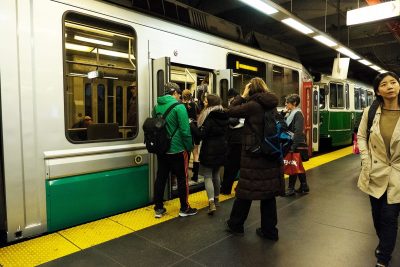The Massachusetts Bay Transportation Authority is accelerating its major renovation of the rail system by condensing eight years of work into one year, causing T lines to experience extended closures throughout 2020.

This program, part of the Building a Better T project, will be a massive undertaking by the MBTA Fiscal and Management Control Board to complete roughly eight years worth of work across the Green, Red, Orange and Blue lines, as well as the commuter rail. In total, the initiative plans to rehabilitate or construct 151,662 feet, or 29 miles, of track, according to the project presentation made to the FMCB.
But these improvements do not come without inconveniences. On the Green Line, both the C and E branches will experience a complete shutdown for one month each in the summer of 2020, according to the press release. Additionally, the Green line will be closed between North Station and Lechmere from May 2020 through April 2021 as part of the Green Line Extension Project.
Closing the lines for long periods of time allows for more efficient work without interruptions, according to the project presentation. The T currently operates for all but around six hours a day and workers must set time aside for setup and clean-up, which then leaves two to three hours of productive work time for T improvements without closing the rail line.
During a joint meeting of the MassDOT control board and the FMCB, a presenter defended the MBTA’s decision to close the T for longer periods of time to produce quicker results.
“The longer windows will provide us the opportunity to take on these larger track rehabilitations and major system efforts,” the presenter said to the board. “We can’t take on larger rehabilitation if we don’t have more time to do it.”
The presenter said undertaking such an initiative now will save T riders from experiencing larger issues in the future.
“Really what the benefit of the acceleration is, is that they’re planned outages,” he said. “And what we’re trying to do is prevent unplanned outages in the future by taking care of the most critical part of the infrastructure.”
The announcement of this undertaking comes as part of the MBTA’s extensive plan to improve the T, working on both the existing infrastructure, as well as on expanding the Green Line and introducing new elements.
MBTA Deputy Press Secretary Lisa Battiston wrote in an email that, in addition to improving and expanding existing infrastructure as part of the the Green Line Transformation Program, a new fleet of “super cars” will begin to replace older Green Line cars.
“Fully accessible and longer, these cars would be comprised of seven sections and five door openings per side,” Battiston wrote, “providing passenger capacity equal to that of two existing Green Line cars.”
In addition to track and car improvements, this program will work to reduce designated slow zones on the Green, Red, and Blue lines, according to the FMCB.
This initiative, however, is not without problems. In the meeting, the FMCB discussed concerns regarding how they would quantifiably measure the benefits of the program, not just in terms of how much track was replaced, but in terms of how riders will be impacted.
FMCB member Chrystal Komegay said she thinks the presentation to the board lacked the commuter’s perspective, and that the plan needs to take into further consideration its impact on the riders.
“The success of this is not that you did eight years of work in one year,” Komegay said. “It only matters to me if I can shave off 10 minutes on my ride from my house to my job.”
Ryan Jones, 30, of Brighton said that he thinks the accelerated repairs will be worth it, despite the inconvenience to travelers.
“It gets the work done faster,” Jones said. “It’s inconvenient because I have to readjust my route… but you do what you can to get around even if it’s an inconvenience.”
Alejandro Clark, 24, of Brighton said he thinks closing certain sections of the Green Line for improvements is probably not worth the inconvenience to riders.
“It’s probably not worth it,” Clark said. “I’d like to think that it’s a greater good situation but I don’t think it’s that simple. I don’t think it’s that black-and-white.”
Avery Richards, 19 of Back Bay said because improving the T is a massive undertaking, closures for extended periods of time make sense.
“Well, how else are they going to get the work done?” Richards said. “They’re doing what they can with as little resources as they possibly have.”





















































































































